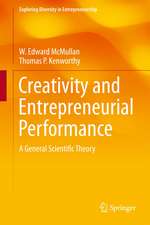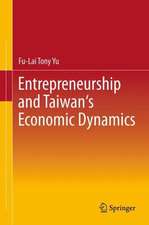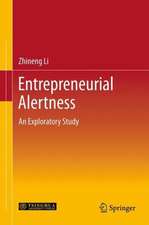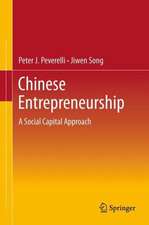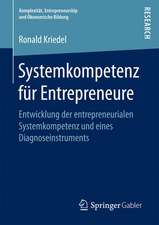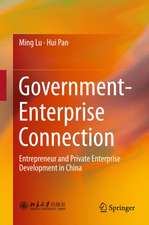Entrepreneurship Education: Experiments with Curriculum, Pedagogy and Target Groups
Editat de Mathew J. Manimala, Princy Thomasen Limba Engleză Hardback – 26 iun 2017
| Toate formatele și edițiile | Preț | Express |
|---|---|---|
| Paperback (1) | 1388.12 lei 43-57 zile | |
| Springer Nature Singapore – 15 aug 2018 | 1388.12 lei 43-57 zile | |
| Hardback (1) | 1628.94 lei 43-57 zile | |
| Springer Nature Singapore – 26 iun 2017 | 1628.94 lei 43-57 zile |
Preț: 1628.94 lei
Preț vechi: 1986.51 lei
-18% Nou
Puncte Express: 2443
Preț estimativ în valută:
311.80€ • 338.79$ • 262.08£
311.80€ • 338.79$ • 262.08£
Carte tipărită la comandă
Livrare economică 21 aprilie-05 mai
Preluare comenzi: 021 569.72.76
Specificații
ISBN-13: 9789811033186
ISBN-10: 9811033188
Pagini: 425
Ilustrații: XV, 407 p. 40 illus.
Dimensiuni: 155 x 235 mm
Greutate: 7.57 kg
Ediția:1st ed. 2017
Editura: Springer Nature Singapore
Colecția Springer
Locul publicării:Singapore, Singapore
ISBN-10: 9811033188
Pagini: 425
Ilustrații: XV, 407 p. 40 illus.
Dimensiuni: 155 x 235 mm
Greutate: 7.57 kg
Ediția:1st ed. 2017
Editura: Springer Nature Singapore
Colecția Springer
Locul publicării:Singapore, Singapore
Cuprins
Entrepreneurship Education: Innovations and Best Practices.- Entrepreneurial Management Education: An Alleyway for Sustainable Economic Growth of Northeast India.- Teaching the Elective, ‘Legal Aspects of Innovation and Entrepreneurship (LAIE)’ to Management Students.- Developing a Curriculum for Entrepreneurship Education: Prioritizing the Content using TOPSIS Method.- Curriculum Reform for Entrepreneurship Education: An Exercise Based on Focused Group Deliberations.- Entrepreneurship Curriculum in Management Programmes: Benchmarking with the Curricula of Top International Universities.- A Brand called ‘YOU’: The Essence of Managing your Image as an Entrepreneur.- Influence of Individual and Socio-cultural Factors on Entrepreneurial Intention.- Relationship between Entrepreneurship Education and entrepreneurial Intentions: A validation Study.- Competency Mapping as a Powerful Tool for Value Creation in the Entrepreneurship Education.- Generating New Venture Ideas: The Use of ‘Consciousness of Abstracting’ in Entrepreneurship Education.- Developing Entrepreneurial Intentions among the Youth: An Innovative Pedagogy based on Experiential Learning.- Educating the New Generation Entrepreneurs: The Role of Alumni Entrepreneurs.- Promoting Entrepreneurship in Indian Higher Educational Institutions: The Role of Entrepreneurial Methodologies.- The Configuration Approach to Entrepreneurship Education: The Case of an Entrepreneurship Course in a Management Programme.- Impact of Entrepreneurship Education on the Entrepreneurial Intentions: A Study of Student Groups in India.- “Orchids in the Wild”:An Investigation into Entrepreneurial Education Effectiveness and Empowerment among Women’s SHGs.- Entrepreneurship Development in Business Schools: An Analysis of the Initiatives in Delhi and NCR.- Business Opportunity Recognition and its Facilitation by Entrepreneurship Education: Perceptions of Nepalese Entrepreneurs.- Government and Institutions’ Role in Promoting Micro Enterprises: A Study on Handicraft Entrepreneurs in Dimapur District, Nagaland.
Notă biografică
Mathew J. Manimala (Fellow-IIMA) is currently the Director, Xavier Institute of Management & Entrepreneurship (XIME), Bangalore, India. Prior to joining the XIME in July 2015, he was a professor and chairperson of the Organizational Behaviour and Human Resource Management (OB-HRM) area at the Indian Institute of Management Bangalore (IIMB), where he also served as the Jamuna Raghavan Chair Professor of Entrepreneurship and as the chairperson of N S Raghavan Centre for Entrepreneurial Learning (NSRCEL). His earlier academic positions were at the Administrative Staff College of India (ASCI) and Cochin University of Science and Technology (CUSAT). He is a recipient of the prestigious Heizer Award of the Academy of Management (AOM) for Outstanding Research in the Field of New Enterprise Development. He has published several research papers and books in the areas of entrepreneurship and organizational behaviour. He is a member of the editorial board of several journals and the editor of South Asian Journal of Management (SAJM).
Princy Thomas is currently working as a faculty in Christ University, Bangalore, and has thirteen years of teaching and research experience. She has worked with Indian Institute of Management Bangalore (IIMB) as Academic Associate. Prior to this, she has worked as lecturer with Xavier Institute of Management & Entrepreneurship (XIME), Bangalore, and Nitte Meenakshi Institute of Technology (NMIT), Bangalore. She has obtained Doctoral Degree from Visvesvaraya Technological University (VTU), Bangalore, India. At the Masters level, she has specialised in management science, human resource management, and computer applications. Princy’s teaching and research interests are in the areas of performance management, compensation strategies and entrepreneurship. She is one of the co-founders of Mentor Max Incubation Services Private Limited, a company that focuses on business incubation for start-ups and accelerator services for existing businesses. She has presented papers in various national and international conferences, published papers in national and international journals, and developed case studies on management and entrepreneurship related issues, besides reviewing manuscripts for academic journals.
Princy Thomas is currently working as a faculty in Christ University, Bangalore, and has thirteen years of teaching and research experience. She has worked with Indian Institute of Management Bangalore (IIMB) as Academic Associate. Prior to this, she has worked as lecturer with Xavier Institute of Management & Entrepreneurship (XIME), Bangalore, and Nitte Meenakshi Institute of Technology (NMIT), Bangalore. She has obtained Doctoral Degree from Visvesvaraya Technological University (VTU), Bangalore, India. At the Masters level, she has specialised in management science, human resource management, and computer applications. Princy’s teaching and research interests are in the areas of performance management, compensation strategies and entrepreneurship. She is one of the co-founders of Mentor Max Incubation Services Private Limited, a company that focuses on business incubation for start-ups and accelerator services for existing businesses. She has presented papers in various national and international conferences, published papers in national and international journals, and developed case studies on management and entrepreneurship related issues, besides reviewing manuscripts for academic journals.
Textul de pe ultima copertă
The book provides an overview of developments in the field of entrepreneurship education, with special reference to global perspectives on innovations and best practices, as well as research in the emerging economy context. It focuses on various experiments in curriculum design, review and reform in addition to the innovative processes adopted for developing new content for entrepreneurship courses, in many cases with an assessment of their impact on students’ entrepreneurial performance. Further, it discusses the pedagogical methods introduced by teachers and trainers to enhance the effectiveness of students’ learning and their development as future entrepreneurs. It explains the various initiatives generally undertaken to broaden the scope of entrepreneurship education by extending it beyond regular students and offering it to other groups such as professionals, technicians, artisans, war veterans, and the unemployed. The book is a valuable resource for researchers and academics working in the field of entrepreneurship education as well as for trainers, consultants, mentors and policy makers.
Caracteristici
Focuses on entrepreneurship education, which is a major tool for economic development
Addresses innovations and experiments in entrepreneurship education, with special reference to curriculum, pedagogy and target groups
Discusses the impact of entrepreneurship education on specific target groups, such as students, artisans, and women’s self-help groups
Includes supplementary material: sn.pub/extras
Addresses innovations and experiments in entrepreneurship education, with special reference to curriculum, pedagogy and target groups
Discusses the impact of entrepreneurship education on specific target groups, such as students, artisans, and women’s self-help groups
Includes supplementary material: sn.pub/extras












